- column
- TECHNOLOGY Q&A
Microsoft Windows: A sensible tool for cleaning up hard disks
Please note: This item is from our archives and was published in 2018. It is provided for historical reference. The content may be out of date and links may no longer function.
Related
AI early adopters pull ahead but face rising risk, global report finds
COSO creates audit-ready guidance for governing generative AI
AI loses ground to pros as taxpayers rethink who should do their taxes
TOPICS
Q. What’s a good disk cleanup tool for managing a hard disk and purging unnecessary files?
A. Windows 10 includes a new tool called Storage sense, an app specifically designed to help you get rid of junk files, which can be helpful when you’re running low on hard disk space. Of course, in Windows 10 you can manually empty your Recycle Bin or delete temporary files to free up space using the Windows Disk Cleanup and Clean up system files tools. However, Storage sense is a newer tool that can perform these tasks (and more) automatically. By default, the Storage sense tool is disabled in Windows 10, but you can turn it on by right-clicking the Windows Menu button and selecting System, Storage, and toggling on the Storage sense tool, as pictured below.

Once activated, this tool will proactively delete any temporary files, files that have been in your Recycle Bin for more than 30 days, and files in your Download folder that haven’t changed in 30 days. Also, if you start to run low on hard disk space, Storage sense can delete any previous versions of Windows 10 as well, but this means you won’t be able to revert to those versions later (which is not much of a problem since I’ve never known anyone to revert to a previous version of Windows). You can fine-tune this tool by selecting the Change how we free up space option (pictured below) to retain files in your Temporary folder, Recycle Bin, or Downloads folder, or to keep files that enable you to revert to previous installations of Windows.
Storage sense can run on computers, tablet PCs (such as a Surface), and Windows smartphones.

About the author
J. Carlton Collins (carlton@asaresearch.com) is a technology consultant, a conference presenter, and a JofA contributing editor.
Submit a question
Do you have technology questions for this column? Or, after reading an answer, do you have a better solution? Send them to jofatech@aicpa.org. We regret being unable to individually answer all submitted questions.


















